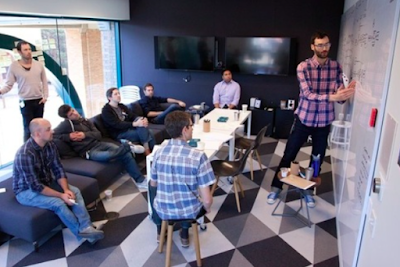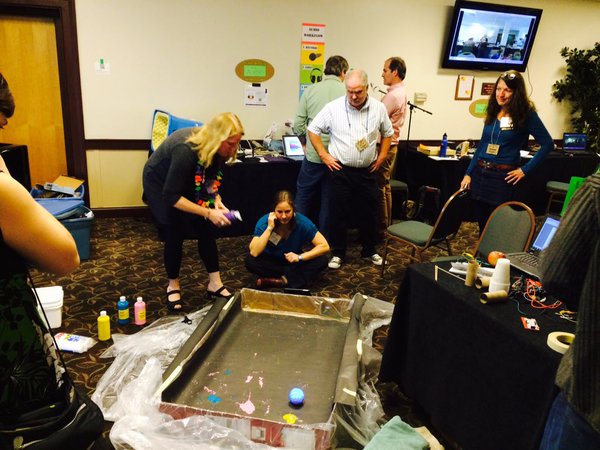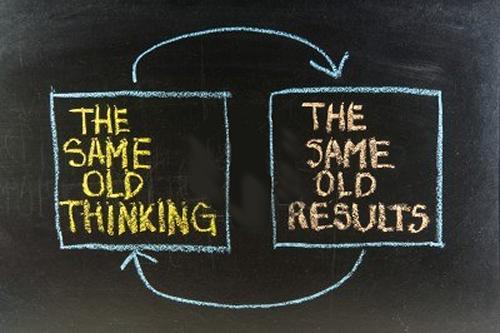A lot of growth mindset discussions center on the traits students and adults can develop. Especially at the start of a school year. Growth mindset vs fixed mindset. Lots of debate going on.
If we're asking individuals to develop a growth mindset, what about a 'growth mindset' for a school?
Is weaving students into some existing and traditional school structures prohibiting growth?
Here are a few ideas on how school and systems within can develop and practice a 'growth mindset.'
Create a common learning language and focal points
Does your school have a common set of learning values for each class? Here's one model form the Science Leadership Academy in Philadelphia, PA.
Inquiry
Research
Collaboration
Reflection
Presentation
Inquiry and project based learning... hands on, collaborative, interactive, project oriented. It's a mission to not only cover content, but make it meaningful and purposeful and social. What discussions is your school having on 'learning'?
Create meaningful and regular teacher PD programs
Build PD time into the day rather than treat it as an add-on to the school day or the same old 'two days per semester' model. As Diana Laufenberg puts it eloquently, "Doing more, faster is not the answer."
Create one half day in the schedule where students have activities (in any combination: Capstone, academic callback, community service, innovation / skill dev labs). During that time Faculty engage in 3 hours of meaningful professional development.
Urban Academy in NYC and
SLA have it figured out... and it's spreading.
Analyze the class / master schedule... and make changes
Analyze start time, breaks, class length, and flow from
a student and adult perspective. Is your schedule working at it's best to promote student learning? How about student health? Is 'social time' built in or are you asking kids to sit quietly for long periods of time with very short breaks?
How does your schools schedule impact family life?
Discuss homework
Does your school have 'homework policies' in place?
Are deadlines on homework completion rigid or flexible?
Is homework dropped on students the day of, or is it advertised for the week so they can plan accordingly?
Dropping excessive amounts of homework on kids with rigid deadlines can be... punishing.
Here's why.
Kids who work? Not just the ones who do... but also the ones
who need to work?
How about it's effect on kids in extra-curricular sports?
Ever seen drama / theater programs practice / rehearsal schedules ramping up to a production?
How about kids with intensive family needs at home?
How about kids with any number or all of the above in tow?
A homework free-for-all can create chaos for kids. For kids in need it can be elitist. It can also promote pretty dangerous fatigue.
I've visited many schools where...
- Homework is graded for understanding but not as a punishment. It's strictly 'formative assessment.' It's evaluated on a 'let's see what you didn't understand approach.'
- The amount of homework given to students is also analyzed constantly and discussed with teachers
- Deadlines are flexible, usually with two-three days leeway.
- Homework was not given over breaks. Novel idea... a 'real' break! ; )
All important discussions for adults in schools to discuss with students and parents.
A focus on 'rigor, discipline, process, and product'.. which translates into more homework with little thought to content or method can have terrible effects on students and families. Combine that mentality with rigid deadlines... well, it's an elitist model, and punishes far too many students.
Have a facilities overview and improvement plan... that keeps moving
Polish, patch, and paint. And keep doing it.
Remove clutter... constantly. Purge that old equipment cast to forgotten closets.
Get some inspiring artwork from students, adults, and professionals in the community up.
There's more to color in schools than 'institutional beige' and athletic colors... and more finishes available than high-gloss... or at least there should be ; )
Refit classrooms
Try removing clutter, reduce / relocate storage, and create more diverse and collaborative workspaces.
Get some color other than beige in the rooms. Try using more than one... a primary and accent color.
Here's an interesting prompt to start a debate. Does your school provide personal or department funds or resources for teachers to populate classrooms? Should teachers with more personal financial resources be able to decorate 'better' than a teacher who doesn't?
Want a pedagogical challenge as a teacher? Try removing the 'teacher desk' from the room... or at least the front of the room. Get up, get involved, sit with students, engage in debate at tables or groups.
Conjure a diverse technology program
Technology is expensive. At it's best... schools / districts will give kids full functional laptops with access to some powerful software connected to robust and creative programs and opportunities. If that's not possible... create a technology program that gives kids a device to access the web and to collaborate with. In all cases, create a program where kids can sign out equipment... laptops, cameras, etc for use.
It's too lengthy here to discuss all the nuances of a great 1-1 technology program, but there are many common traits of successful ones... and also those that are not very successful.
Build learning opportunities that connect to meaningful projects and community
Do students know much or get the opportunity to learn about the surrounding community? What needs in the community can be identified and brought into the school and turned into projects?
Make connections with experts outside the school
It's hard to admit the best expertise isn't always in the building. Seek parent help and from long-time locals and business owners to identify local expertise. Bring these experts in or visit them. Establish relationships that can help students and adults connect and explore. Connect with colleges and professionals.
There are a few ideas to get things moving. There are others... a robust advisory program, travel programs, hybrid classes... but we'll talk about those later on.
So...
If we're asking individuals to grow, schools and their structures must do the same.



















